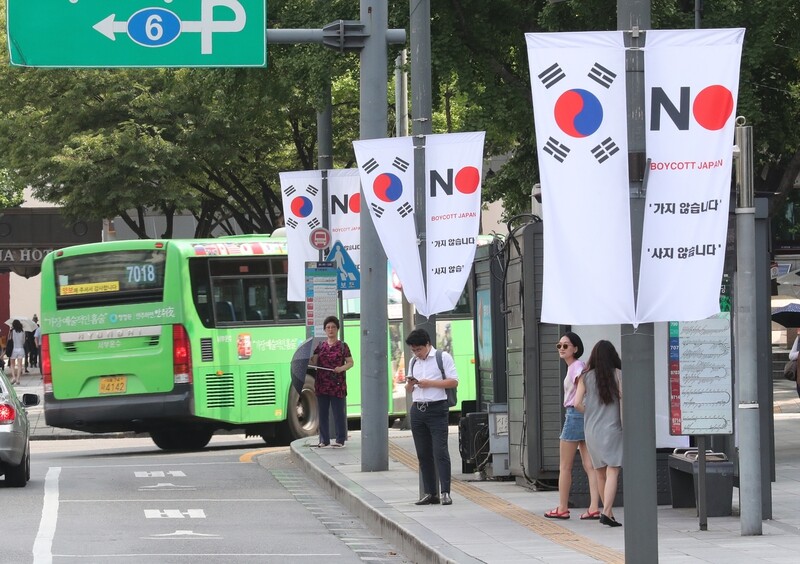hankyoreh
Links to other country sites 다른 나라 사이트 링크
Over 50% of S. Korean companies worried about losses if Japan’s export controls remain long term

Over half of South Korean companies doing business with Japanese counterparts are concerned about losses if export controls remain in place over the long term, survey results show.
More than half of companies gave “changing clients” as their response measure against the Japanese export controls, while few of them actually named independent technology development or other attempts at domestic production.
The Korea Chamber of Commerce and Industry (KCCI) released results on Sept. 3 from a survey on “industry effects of the Japanese export controls and response tasks” conducted with 500 companies that have business relationships with Japanese counterparts. The findings showed 67% responding that trust in their business relationships with Japanese companies had been weakened.
“While Japanese companies had been rated highly for trust in the past thanks to their outstanding quality and timely production system, the perception of them as stable business partners has undergone a shift since the export controls [were instituted],” said Kang Seok-gu, chief of the KCCI’s industry policy team.
In terms of measures to prepare for the possibility of Japanese export controls being intensified or dragging out into the long term, 73% of large companies said they had made or were making preparations already. In contrast, only 26% of small businesses said they had prepared or were preparing measures. At 53.3%, the most frequently named concrete response plan was to change clients, including the location of new clients and development in regions outside of Japan. Stronger cooperation with existing Japanese clients was named second at 20.3%, followed by inventory acquisition at 8.6%. Only 6.1% of respondents named domestic production and other independent technology development, which has been an area of focus by the South Korean government.
In terms of the effects of the Japanese export controls on South Korean industry, 55% of respondents, or slightly over half, predicted they would provide an opportunity for boosting industry competitiveness, while just 30.6% predicted industry competitiveness would be weakened. Fifty-five percent of respondents expressed concerns that they may suffer losses if the export controls remain in place over the long term, while 45% said they did not anticipate losses. By industry type, large losses were predicted by companies in the areas of tourism (87%) and semiconductors (85%).
Following the South Korean government’s announcement last month of measures to boost competitiveness in materials, components, and equipment, the area most frequently named as a focus for government support was increased tax deductions for research and development (37.8%), followed by the establishment of a cooperation system between large and small companies (32%) and regulatory innovations (19.4%).
By Kwack Jung-soo, Business correspondent
Please direct comments or questions to [english@hani.co.kr]

Editorial・opinion
![[Editorial] Intensifying US-China rivalry means Seoul must address uncertainty with Beijing sooner than later [Editorial] Intensifying US-China rivalry means Seoul must address uncertainty with Beijing sooner than later](https://flexible.img.hani.co.kr/flexible/normal/500/300/imgdb/original/2024/0517/8117159322045222.jpg) [Editorial] Intensifying US-China rivalry means Seoul must address uncertainty with Beijing sooner than later
[Editorial] Intensifying US-China rivalry means Seoul must address uncertainty with Beijing sooner than later![[Column] When ‘fairness’ means hate and violence [Column] When ‘fairness’ means hate and violence](https://flexible.img.hani.co.kr/flexible/normal/500/300/imgdb/original/2024/0516/7417158465908824.jpg) [Column] When ‘fairness’ means hate and violence
[Column] When ‘fairness’ means hate and violence- [Editorial] Yoon must stop abusing authority to shield himself from investigation
- [Column] US troop withdrawal from Korea could be the Acheson Line all over
- [Column] How to win back readers who’ve turned to YouTube for news
- [Column] Welcome to the president’s pity party
- [Editorial] Korea must respond firmly to Japan’s attempt to usurp Line
- [Editorial] Transfers of prosecutors investigating Korea’s first lady send chilling message
- [Column] Will Seoul’s ties with Moscow really recover on their own?
- [Column] Samsung’s ‘lost decade’ and Lee Jae-yong’s mismatched chopsticks
Most viewed articles
- 1[Editorial] Transfers of prosecutors investigating Korea’s first lady send chilling message
- 2[Exclusive] Unearthed memo suggests Gwangju Uprising missing may have been cremated
- 3[Column] US troop withdrawal from Korea could be the Acheson Line all over
- 4Xi, Putin ‘oppose acts of military intimidation’ against N. Korea by US in joint statement
- 5[Column] When ‘fairness’ means hate and violence
- 6‘Shot, stabbed, piled on a truck’: Mystery of missing dead at Gwangju Prison
- 7[Editorial] Intensifying US-China rivalry means Seoul must address uncertainty with Beijing sooner t
- 8Spotlight turns to Hyundai Group Chairwoman’s visit to North Korea
- 9[Column] Samsung’s ‘lost decade’ and Lee Jae-yong’s mismatched chopsticks
- 10[Column] Will Seoul’s ties with Moscow really recover on their own?